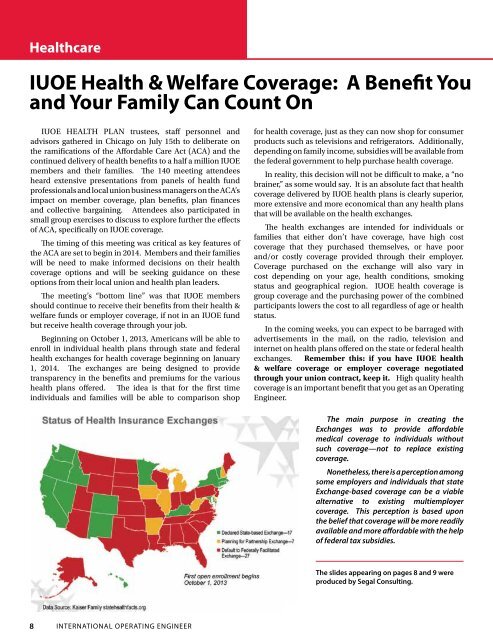Operating Engineer - Summer 2013
The quarterly magazine of the International Union of Operating Engineers.
The quarterly magazine of the International Union of Operating Engineers.
Create successful ePaper yourself
Turn your PDF publications into a flip-book with our unique Google optimized e-Paper software.
Healthcare<br />
IUOE Health & Welfare Coverage: A Benefit You<br />
and Your Family Can Count On<br />
IUOE health plan trustees, staff personnel and<br />
advisors gathered in Chicago on July 15th to deliberate on<br />
the ramifications of the Affordable Care Act (ACA) and the<br />
continued delivery of health benefits to a half a million IUOE<br />
members and their families. The 140 meeting attendees<br />
heard extensive presentations from panels of health fund<br />
professionals and local union business managers on the ACA’s<br />
impact on member coverage, plan benefits, plan finances<br />
and collective bargaining. Attendees also participated in<br />
small group exercises to discuss to explore further the effects<br />
of ACA, specifically on IUOE coverage.<br />
The timing of this meeting was critical as key features of<br />
the ACA are set to begin in 2014. Members and their families<br />
will be need to make informed decisions on their health<br />
coverage options and will be seeking guidance on these<br />
options from their local union and health plan leaders.<br />
The meeting’s “bottom line” was that IUOE members<br />
should continue to receive their benefits from their health &<br />
welfare funds or employer coverage, if not in an IUOE fund<br />
but receive health coverage through your job.<br />
Beginning on October 1, <strong>2013</strong>, Americans will be able to<br />
enroll in individual health plans through state and federal<br />
health exchanges for health coverage beginning on January<br />
1, 2014. The exchanges are being designed to provide<br />
transparency in the benefits and premiums for the various<br />
health plans offered. The idea is that for the first time<br />
individuals and families will be able to comparison shop<br />
for health coverage, just as they can now shop for consumer<br />
products such as televisions and refrigerators. Additionally,<br />
depending on family income, subsidies will be available from<br />
the federal government to help purchase health coverage.<br />
In reality, this decision will not be difficult to make, a “no<br />
brainer,” as some would say. It is an absolute fact that health<br />
coverage delivered by IUOE health plans is clearly superior,<br />
more extensive and more economical than any health plans<br />
that will be available on the health exchanges.<br />
The health exchanges are intended for individuals or<br />
families that either don’t have coverage, have high cost<br />
coverage that they purchased themselves, or have poor<br />
and/or costly coverage provided through their employer.<br />
Coverage purchased on the exchange will also vary in<br />
cost depending on your age, health conditions, smoking<br />
status and geographical region. IUOE health coverage is<br />
group coverage and the purchasing power of the combined<br />
participants lowers the cost to all regardless of age or health<br />
status.<br />
In the coming weeks, you can expect to be barraged with<br />
advertisements in the mail, on the radio, television and<br />
internet on health plans offered on the state or federal health<br />
exchanges. Remember this: if you have IUOE health<br />
& welfare coverage or employer coverage negotiated<br />
through your union contract, keep it. High quality health<br />
coverage is an important benefit that you get as an <strong>Operating</strong><br />
<strong>Engineer</strong>.<br />
The main purpose in creating the<br />
Exchanges was to provide affordable<br />
medical coverage to individuals without<br />
such coverage—not to replace existing<br />
coverage.<br />
Nonetheless, there is a perception among<br />
some employers and individuals that state<br />
Exchange-based coverage can be a viable<br />
alternative to existing multiemployer<br />
coverage. This perception is based upon<br />
the belief that coverage will be more readily<br />
available and more affordable with the help<br />
of federal tax subsidies.<br />
The slides appearing on pages 8 and 9 were<br />
produced by Segal Consulting.<br />
8<br />
international operating engineer

















